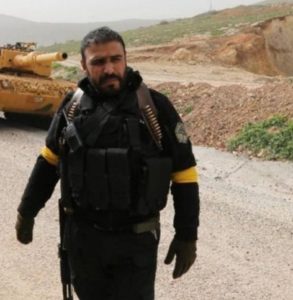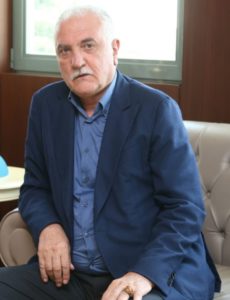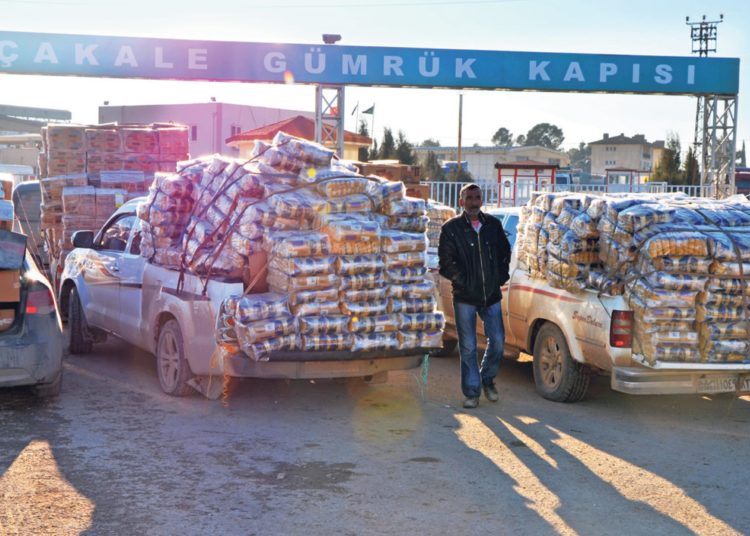Abdullah Bozkurt/Stockholm
Torture, ill-treatment, abduction, the plundering of economic resources, the confiscation of buildings and land and the levying of taxes in territories under the control of the Turkish military and affiliated armed groups could cause Turkey to be charged with war crimes, UN investigators have warned.
According to a series of reports issued by UN experts in recent years, Turkey is responsible for the safety and security of people in the areas of an occupation maintained in northern Syria by the Turkish military, police and an array of affiliated armed groups including the rebel-led Syrian National Army.
“[I]n areas under effective Turkish control, Turkey has a responsibility to, as far as possible, ensure public order and safety, and to afford special protection to women and children. Turkey remains bound by applicable human rights obligations vis-à-vis all individuals present in such territories,” experts from the Independent International Commission of Inquiry on the Syrian Arab Republic said in their latest report issued on February 8, 2022.
“Confiscation of private property by parties to the conflict, in particular when generating personal gain, such as through the sale of crops or the right to harvest crops or the imposition of ‘taxes’, may amount to pillage, which is a war crime,” the report stated, stressing that Turkey could face such crimes when Turkish forces fail to intervene to stop violations.
The UN reports have documented serious human rights violations in Syria by all parties involved in the conflict. The parts of the reports that focus on areas controlled by Turkey indicate responsibility on the part the government of President Recep Tayyip Erdoğan, which ordered military operations in Syrian territory.
The February 2022 UN report contains a number of warnings for the Turkish government:
Yet such warnings have so far fallen on deaf ears in Ankara, where the Erdoğan government apparently gave carte blanche for the conduct of Turkish troops, police, intelligence officers and allied jihadist groups, amounting to total impunity. Erdoğan and his political and business associates have been benefiting from the conflict, making windfall profits from cross-border trade and taking huge cuts from smuggled goods, from oil to historic artifacts and from scrap metal to forcibly seized harvests.
The UN noted that “patterns of looting, pillage, occupation and confiscation of property, including through ‘taxes’, continued, particularly during the olive harvest season.”
The harvest from thousands of olive trees was taken – sometimes under the guise of “taxes” – by armed groups, according to the findings. Between July and November 2021, in Ma’batli and Bulbul, situated in the Aleppo Governorate, the Levant Front and the Sultan Murad Division sold the rights to harvest olive crops to third parties. These groups operated in concert with the Turkish military in past military interventions and continue to coordinate their actions with Turkish authorities.
Land and property owners who objected to the usurpation of their rights received threats and were subjected to beating, abduction and even murder in some cases. “One woman who approached Turkish officials in Sheikh Hadid district to complain about the appropriation of her home was told to speak with the Suleiman Shah Brigade, to whom authority had apparently been delegated by Turkey to deal with such cases,” the UN report documented.

Throughout the Afrin region, which is under the control of the Turkish military, property owned by Kurds was looted and appropriated in coordinated efforts by Syrian National Army members. “For example, in September 2019, civilians in the Shaykh al-Hadid subdistrict (of the Afrin region) described how members of Division 14, Brigade 142 (the Suleiman Shah Brigade) of the Syrian National Army had gone from door to door instructing Kurdish families with fewer than three members to vacate their houses to accommodate individuals arriving from outside of Afrin.”
Similarly in Afrin, the properties of Kurds in the Ra’s al-Ayn region who had fled battles during Turkey’s Operation Peace Spring military offensive in October 2019 were also appropriated by Syrian National Army forces. Members of Division 22 (the Hamza Brigade) of the Syrian National Army engaged in widespread and organized looting and property appropriation in Ra’s al-Ayn, including by marking house walls with the names of individual brigades.
The UN report in September 2019 detailed a series of rights violations in Syria after a Turkish military intervention:
According to the UN, the looting of properties and goods, the sale of seized goods and transportation were coordinated, indicating a premeditated policy implemented by armed factions and several brigades.
In one case the home of a Kurdish family was appropriated by members of Division 22 (the Hamza Brigade) and handed over the Foundation for Human Rights and Freedoms and Humanitarian Relief (IHH), a Turkish charity that is linked to al-Qaeda. The IHH turned the property into a religious school that was officially inaugurated on June 22, 2019 by the governor of Turkey’s border province of Şanlıurfa. The Turkish military also appropriated a number of homes in Syria’s Dawoudiya region.

Such practices help Turkish President Erdoğan sustain his war-profiteering schemes on the back of the Syrians’ plight. According to revelations made by fugitive Sedat Peker, a former ally of Erdoğan and a convicted mobster, the point man who handles illegal trade in Syria on behalf of Erdoğan is Ramazan Öztürk, the son of Erdoğan’s long-time associate Talip Öztürk.
The Öztürk family has been involved in an illicit trade between Turkey and Syria that has included the smuggling of oil purchased from the Islamic State in Iraq and Syria (ISIS) in the past, moving stolen historical artifacts and reselling olive oil and wheat bought cheaply from Syrian farmers under threat. The family made a fortune from a scrap metal trade that involved melting copper, aluminum and other materials stolen from Syrian factories and infrastructure.
Part of a letter submitted to the UN by the Syrian ambassador:
In a letter submitted to the UN Security Council on November 24, 2021, Syrian Ambassador to the UN Bassam Sabbagh complained that the Turkish military brought a large number of Turks to harvest in wheat in seized land in Afrin, after which the crop was transported to Turkey. The residents were prevented from going to their fields.
Muhammad al-Jasim, known by his nom de guerre Abu Amsha, the leader of the Suleiman Shah Brigade, works closely with the Öztürk family and helps run this illicit trade with his fighters backed by the Turkish military. Abu Amsha is known for his brutal tactics including torture and ill-treatment to coerce residents to pay illegal taxes and forcing farmers to sell their harvest at cheap prices. He and his men were accused of raping women in the territories they control.
The UN 2020 report on Syria:












